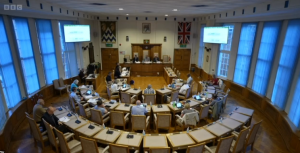BBC LDRS reports: A Surrey council [Epsom and Ewell] must pay out up to £500,000 after failing to properly check the condition of a major leisure centre before handing it over to a new operator. Poor ventilation, damp and ‘possible roof cracks’ were cited as some of the problems related to the “fabric” of the building.
Epsom and Ewell Borough Council has agreed to cover the costs of urgent repairs at Rainbow Leisure Centre after the new contractors took over the site and uncovered a long list of issues, some relating to the structure and fabric of the building. Places Leisure took over the contract on October 1, 2025, but has not yet signed on the dotted line, the LDRS understands.
The pay out was approved via a confidential urgent decision, seen by the Local Democracy Reporting Service (LDRS), after Places Leisure said it should not be responsible for fixing the issues.
An urgent decision is when a council cannot wait until the usual decision-making committee process as it could harm the public or council interests.
Some of the problems relate to the fabric of the building, for which the council is responsible, the LDRS understands. This is despite the council previously insisting it had carried out such checks.
In a public report dated June 2025, Epsom and Ewell Borough Council said it had commissioned a stock condition report to make sure the building was handed over in good nick.
As the LDRS understands, council officers believed the centre would be handed back in good condition. An external consultant was used, but their inspection was not invasive, meaning hidden problems may not have been picked up. But just six months later, the authority is now facing a bill of up to £500k to fix problems that either were missed or not properly dealt with because the council did not know about them.
When Places took over, it found issues it believed the previous operator should have fixed. Some of the problems raised include:
- Fire alarm faults
- Lift issues
- Broken seating
- Damaged glazing
- Faulty toilets
- Poor ventilation
- Damp
- Possible roof cracks
- Machinery at “end of life”
Some were flagged as health and safety risks, meaning urgent action was needed to keep the centre safe and open.
The council has now agreed to let Places carry out the repairs and reclaim the costs by reducing the management fee it pays back to the council. Officers said this is the “most cost-effective” option, but it effectively means residents are picking up the tab.
Why is the council paying?
Under the contract, some repairs fall to the council as landlord responsibilities. Others may be recoverable from former operator GLL, but legal experts warn the council is unlikely to claw back the full amount. GLL has been contacted for comment. [See below for additional reporting.]
The authority plans to dip into its ‘dilapidation’ reserve, a pot of money set aside for building repairs, to cover the shortfall. Officers admit the final cost is still being worked out, but estimate it could reach up to £500,000.
Opposition fury
Councillors have slammed the council for not knowing the state of its own properties.
Cllr Alex Coley, member of the Independent group (Ruxley), said: “I’d have hoped that the council as landlord would understand the condition of the leisure centre to establish its potential liability.”
Labour group leader, Cllr Kate Chinn, (Court) hit out at the ruling Residents’ Association (RA), calling the situation a “shocking scandal”.
She said: “This secrecy wasn’t about keeping the costs involved from the parties to the negotiations as they already know them. It was about preventing the public from learning how incompetent the RA are.”
She added: “Cllr Neil Dallen (RA Town) has rightly owned this fiasco, but without realising that his ‘nothing to see’ attitude that council tax payers should expect to be routinely stuck with bills on this scale shows how complacent he is with their money.”
She accused the ruling group of being distracted: “The RA have clearly taken their eye off the ball as they focus on a self-serving attempt to create new parish councils and new roles for themselves.”
Cllr James Lawrence, leader of the Liberal Democrat group (College), said the situation shows “the importance of maintaining key properties so they are in good working condition and ensuring the status of our properties is communicated to both councillors and residents in good time.”
Council response
Council leaders defended the decision, saying negotiations are normal during handovers. Councillors Neil Dallen and Clive Woodbridge (RA Ewell Village) said: “Rainbow Leisure Centre transferred to a new operator, Places Leisure, on 1 October 2025. Since then, we’ve been pleased to see a number of improvements at the centre.
“This marks the beginning of an exciting new chapter for the leisure centre… including significant investment to upgrade the gym, studios, swimming changing rooms and more, which are already underway.”
They added: “With any handover, it is normal practice for there to be negotiations around works to be carried out which form part of the contract finalisation.”
However, they refused to release further information, saying: “Details relating to terms and financial arrangements are commercially sensitive and therefore not in the public domain.”
Places Leisure
A spokesperson said: “Places Leisure took over the operation and management of Rainbow Leisure Centre in partnership with Epsom and Ewell Borough Council on 1st October 2025. We are excited to work closely with the Council to implement changes and significant investment at the centre to make a positive impact for the local community.”
Emily Dalton LDRS – the BBC’s Local Democracy Reporting Service
Additional reporting from Epsom and Ewell Times:
In a further twist GLL has supplied Epsom and Ewell Times a response to the issues: ““GLL was proud to partner with Epsom and Ewell Council on the design and opening of Rainbow Leisure Centre over 20 years ago. This innovative and award-winning centre has been extremely successful over the 20 years of GLL’s tenure, engaging millions of local residents in activity, improving their health and wellbeing.
“GLL is unaware of any legal claim that the Council is looking to bring in relation to the standard of the building on handover, especially as there are set protocols to deal with building handovers prior to any instigation of legal action. As background, the Council undertook, via specialist contractors, a full survey of the building prior to GLL exiting. As is normal in all leisure transfers, items that were identified for [repair or rectification] in that survey for GLL were all completed prior to handover and signed off by the specialist contractors on behalf of the Council. GLL handed the building over to the standard required by the Council and under the contract.”
It is normal practice for Councils as landlords to have rights of periodic entry and inspection of premises it engages contractors to manage. Either the Council was negligent in failing to insert such rights in the contract with GLL or the Council has been negligent over an extended period of years in failing to carry out inspections or to carry out inspections properly.
The Council has made fully public announcements that Places commenced its contract on 1st October 2025. See Epsom and Ewell Times report: Epsom’s Rainbow Leisure Centre Places new operators. The Information Commissioner has made plain that Council’s cannot evade accountability by claims of ongoing contractual negotiations. The tender process having ended for both GLL and Places means there is little if any financially sensitive information to protect justifying a confidential label on information that exposes probable Council incompetence.
Epsom and Ewell Times asked Epsom and Ewell Borough Council a series of questions about these issues and received the same “nothing to see here” response from Cllr Dallen as obtained by the BBC’s Local Democracy Reporting Service (LDRS) reporter Emily Dalton, as above. The Epsom and Ewell Times has thus submitted to Epsom and Ewell Borough Council formal Freedom of Information Act demands for relevant information.

Related reports:
Epsom’s Rainbow Leisure Centre Places new operators













